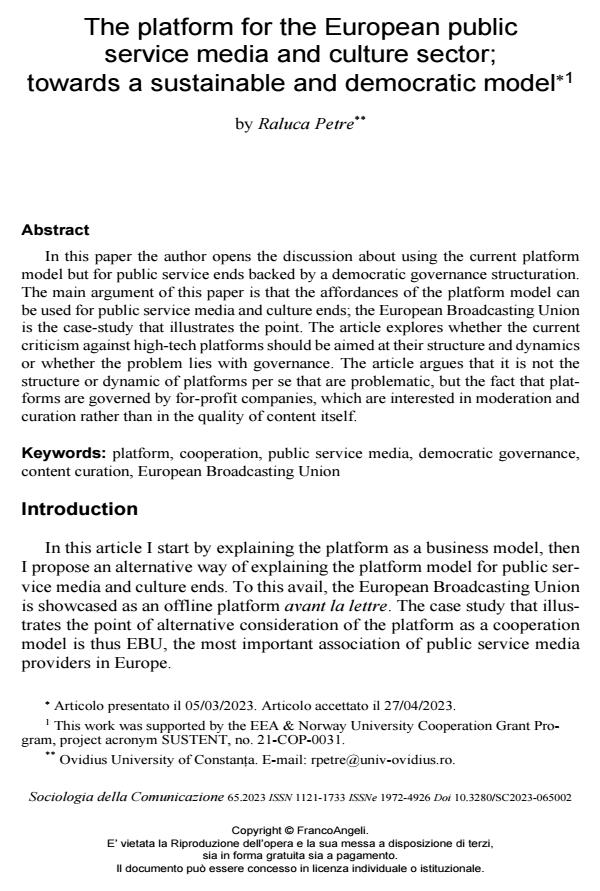The platform for the European public service media and culture sector; towards a sustainable and democratic model
Titolo Rivista SOCIOLOGIA DELLA COMUNICAZIONE
Autori/Curatori Raluca Petre
Anno di pubblicazione 2023 Fascicolo 2023/65
Lingua Inglese Numero pagine 18 P. 13-30 Dimensione file 286 KB
DOI 10.3280/SC2023-065002
Il DOI è il codice a barre della proprietà intellettuale: per saperne di più
clicca qui
Qui sotto puoi vedere in anteprima la prima pagina di questo articolo.
Se questo articolo ti interessa, lo puoi acquistare (e scaricare in formato pdf) seguendo le facili indicazioni per acquistare il download credit. Acquista Download Credits per scaricare questo Articolo in formato PDF

FrancoAngeli è membro della Publishers International Linking Association, Inc (PILA), associazione indipendente e non profit per facilitare (attraverso i servizi tecnologici implementati da CrossRef.org) l’accesso degli studiosi ai contenuti digitali nelle pubblicazioni professionali e scientifiche.
In this paper the author opens the discussion about using the current platform model but for public service ends backed by a democratic governance structu-ration. The main argument of this paper is that the affordances of the platform model can be used for public service media and culture ends; the European Broadcasting Union is the case-study that illustrates the point. The article explores whether the current criticism against high-tech platforms should be aimed at their structure and dynamics or whether the problem lies with governance. The article argues that it is not the structure or dynamic of platforms per se that are problem-atic, but the fact that platforms are governed by for-profit companies, which are interested in moderation and curation rather than in the quality of content itself.
Parole chiave:platform, cooperation, public service media, democratic governance, content curation, European Broadcasting Union
- Information as public good and public service media in Europe: Introduction to this special issue Raluca Petre, in European Journal of Communication /2024 pp.547
DOI: 10.1177/02673231241293548 - The European Broadcasting Union: corporate management and voluntary work Raluca Petre, in European Journal of Communication /2024 pp.569
DOI: 10.1177/02673231241290085
Raluca Petre, The platform for the European public service media and culture sector; towards a sustainable and democratic model in "SOCIOLOGIA DELLA COMUNICAZIONE " 65/2023, pp 13-30, DOI: 10.3280/SC2023-065002